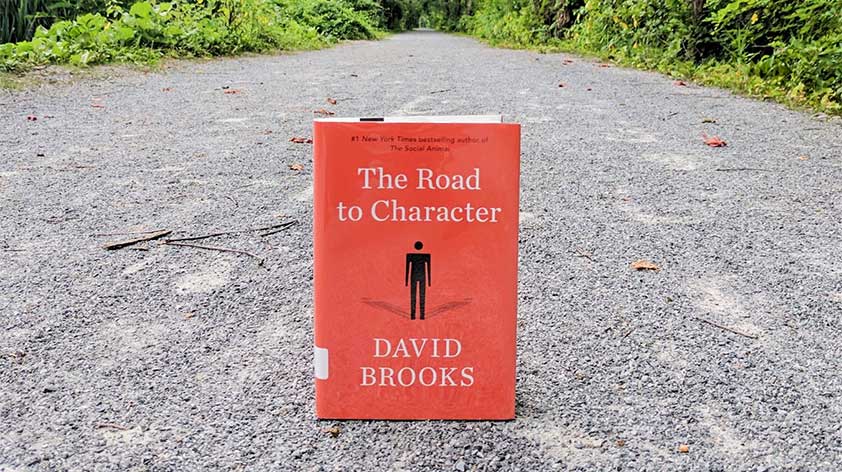
Title: The Road to Character
Authors: David Brooks
Year: 2016
Publisher: Penguin Random House UK
“Failure leads to the greatest success, which is humility and learning. In order to fulfill yourself, you have to forget yourself. In order to find yourself, you have to lose yourself.” -David Brooks
“The Road to Character” is a book that will cause you to reflect on your life, actions, and what you want from life.
Through the lives of people like Frances Perkins (American workers-rights advocate), Ida Eisenhower (the mother of U.S. President Dwight D. Eisenhower), Dorothy Day (American journalist, social activist and anarchist), George Eliot (the leading writer of the Victorian era), Samuel Johnson (an English writer) and more, who through pain, suffering and a feeling of being lost and empty, found what they love and created a life full of meaning while helping their communities.
In this book review, I share my top 5 key points from this amazing book about finding and building your character.
Adam I vs. Adam II
“Since self-control is a muscle that tires easily, it is much better to avoid temptation in the first place rather than try to resist it once it arises.” -David Brooks
Following Soloveitchik theory (from the Jewish modern philosopher) David presents us this idea of Adam I and Adam II. The first one refers to the persons and values our modern society promotes, such as materialism, individualism, narcissism, egocentrism, etc. The second one refers to values such as community, self-sacrifice, virtue, etc.
The idea behind this is that we are creating/forming people with anti-values, people who will value money and fame instead of real connections. And, consequently, people end up feeling lonely, miserable, and often empty.
The Problem with the Institutions
“You should ask certain questions: What is the purpose of my life? What do I want from life? What are the things that I truly value, that are not done just to please or impress the people around me?” -David Brooks
Through the stories in “The Road to Character” book, we can see how the institutions from the past (universities, for example) were made to help you pass from being a child to an adult, they were made to build character. Nowadays, our institutions pressure us to be perfect (under their standards, which can be useless in the real world) while promoting individualism.
Adam I Society
“The social media maven spends his or her time creating a self-caricature, a much happier and more photogenic version of real life. People subtly start comparing themselves to other people’s highlight reels.” -David Brooks
Sticking with the idea of the above point, it is not only our institutions but our entire system that’s promoting Adam I values.
We praise fake heroes, we praise violence, we praise delinquency, with the excuse of anarchy while they make millions lying to us. On the other hand, this change of values started when the positive psychology movement was born.
People started focusing on themselves, which might sound like something positive, but it promotes leaving the community aside by always looking for what feels right in the short term (but feels wrong in the long term).
Ivan Ilych
“Recovering from suffering is not like recovering from a disease. Many people don’t come out healed; they come out different.” -David Brooks
There is a story in the last chapter called The Death of Ivan Ilych, which is a novel by Tolstoy, where it talks about a man who based his life on being Adam I (the best at work but the opposite at home), but then he realises that he’s dying and his whole perspective changes.
He wants to become Adam II, he wants to be a good father, a good husband, and a good friend, but time is not on his side.
What David wants to show with this story is that sometimes we act like Ilych, we want to change and follow virtue and, the point David is trying to make, we have what Ilych lacks: time.
The Humility Code
“The good news of this book is that it is okay to be flawed, since everyone is. Sin and limitation are woven through our lives.” -David Brooks
In conclusion, I will share 10 of the 15 points from the Humility Code that David presents as a guide that I think we should all follow and reflect on:
- We do not live for happiness; we live for holiness.
- Proposition one defines the goal of life.
- Although we are flawed creatures, we are also splendidly endowed.
- In the struggle against your weakness, humility is the greatest virtue.
- Pride is the central vice.
- Once the necessities for survival are satisfied, the struggle against sin and virtue is the central drama of life.
- Character is built in the course of your inner confrontation.
- The things that lead us astray are short-term (lust, fear, vanity, gluttony).
- No person can achieve self-mastery on his or her own.
- We are ultimately saved by grace.
I encourage you to reflect on these points and to keep learning from “The Road to Character“. Feel free to comment your thoughts below!









